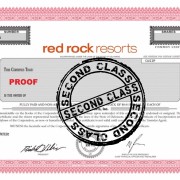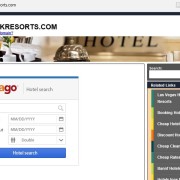Deutsche Bank Would Have Valued Red Rock at $5.39 Per Share a Year Ago
Prospective investors in Red Rock Resorts should ask Deutsche Bank how, in its opinion, the value of Station Casinos could have more than tripled in little over a year.
According to a 2/17/15 analyst report by Deutsche Bank gaming high-yield analyst Andrew Zarnett, Station Casinos LLC, as of 12/31/2014, was estimated to have an enterprise value to be $2.59 billion, which would have implied an equity valuation of $624.6 million after subtracting net debt of $1.97 billion. That equity valuation would have translated to about $5.39 per share with the fully-diluted number of shares outstanding of 115.9 million found in Red Rock’s 4/15/16 S-1/A filing
Red Rock’s 4/15/16 S-1/A filing shows an IPO price range of $18.0 to $21.0 per share. Using the mid-point of $19.5 per share and the fully diluted shares outstanding figure of 115.85 million, the company and its underwriters, one of whom is Deutsche Bank, are offering an equity valuation of $2.26 billion and, adding net debt of $2.04 billion, an enterprise value of $4.30 billion for Station Casinos LLC.
Station Casinos Valuation Jump
| 12/31/14 | 4/15/16 | |
| Enterprise value | $2,590 million | $4,298 million |
| Net debt | $1,965 million | $2,039 million |
| Equity | $625 million | $2,259 million |
| Implied per share price on 115.85 million shares outstanding | $5.29 | $19.5 |
From 12/31/14 to 4/15/16, the share prices of four publicly-traded regional gaming operators (BYD, PENN, PNK, ISLE) rose by an average of 61%.
Investors should ask Deutsche Bank how, in its opinion, the value of Station Casinos could have more than tripled in little over a year.
- Download our unauthorized roadshow presentation, “Red Rock Resorts: A Second-Class IPO” here.
- The insiders are cashing out at a high price compared to the company’s estimated equity.
- Growth concerns in the company’s primary Las Vegas locals market and the lack of new development agreements in the tribal gaming market.
- The tax receivable agreement could drain substantial amount of cash out of the company and affect free cash flow.
- The dual-class structure will make public investors second-class shareholders.
- The lack of disclosure regarding the regulatory problems of Deutsche Bank, a 25% current owner.











